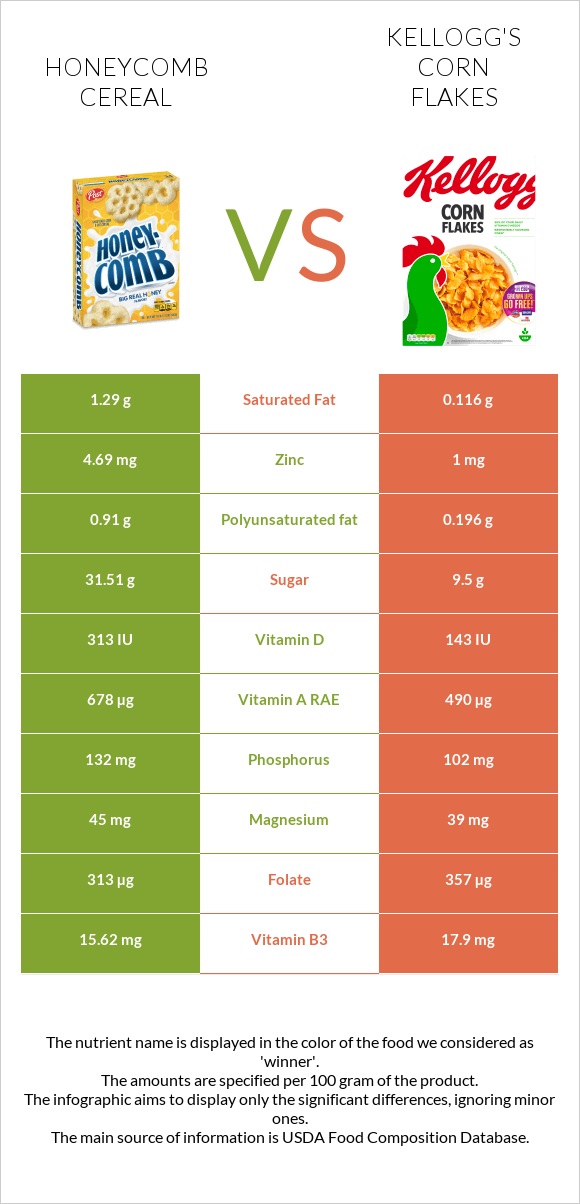Honeycomb Cereal vs. Kellogg's Corn Flakes — In-Depth Nutrition Comparison
Compare
What are the main differences between honeycomb Cereal and kellogg's Corn Flakes?
- Honeycomb Cereal is richer in zinc, vitamin D, and vitamin A, yet kellogg's Corn Flakes are richer in iron, vitamin C, vitamin B6, vitamin B2, vitamin B3, vitamin B1, and vitamin B12.
- Kellogg's Corn Flakes' daily need coverage for iron is 256% higher.
- Honeycomb Cereal has 5 times more zinc than kellogg's Corn Flakes. Honeycomb Cereal has 4.69mg of zinc, while kellogg's Corn Flakes have 1mg.
We used Cereals ready-to-eat, POST, Honeycomb Cereal and Cereals ready-to-eat, KELLOGG, KELLOGG'S Corn Flakes types in this comparison.
Infographic

Infographic link
Mineral Comparison
Mineral comparison score is based on the number of minerals by which one or the other food is richer. The "coverage" charts below show how much of the daily needs can be covered by 300 grams of the food.
| Contains more MagnesiumMagnesium | +15.4% |
| Contains more CalciumCalcium | +120% |
| Contains more ZincZinc | +369% |
| Contains more PhosphorusPhosphorus | +29.4% |
| Contains less SodiumSodium | -24.1% |
| Contains more SeleniumSelenium | +25.3% |
| Contains more PotassiumPotassium | +18.3% |
| Contains more IronIron | +242.4% |
| Contains more CopperCopper | +52.3% |
Vitamin Comparison
Vitamin comparison score is based on the number of vitamins by which one or the other food is richer. The "coverage" charts below show how much of the daily needs can be covered by 300 grams of the food.
| Contains more Vitamin AVitamin A | +38.4% |
| Contains more Vitamin EVitamin E | +41.7% |
| Contains more Vitamin DVitamin D | +116.7% |
| Contains more Vitamin KVitamin K | +∞% |
| Contains more Vitamin CVitamin C | +∞% |
| Contains more Vitamin B1Vitamin B1 | +14.5% |
| Contains more Vitamin B2Vitamin B2 | +14.3% |
| Contains more Vitamin B3Vitamin B3 | +14.6% |
| Contains more Vitamin B6Vitamin B6 | +14.7% |
| Contains more FolateFolate | +14.1% |
All nutrients comparison - raw data values
| Nutrient |  |
 |
DV% diff. |
| Iron | 8.44mg | 28.9mg | 256% |
| Zinc | 4.69mg | 1mg | 34% |
| Vitamin C | 0mg | 21mg | 23% |
| Vitamin D | 313 IU | 143 IU | 21% |
| Vitamin A | 678µg | 490µg | 21% |
| Vitamin D | 7.8µg | 3.6µg | 21% |
| Vitamin B6 | 1.56mg | 1.79mg | 18% |
| Vitamin B2 | 1.33mg | 1.52mg | 15% |
| Vitamin B1 | 1.17mg | 1.34mg | 14% |
| Vitamin B3 | 15.62mg | 17.9mg | 14% |
| Vitamin B12 | 4.69µg | 5µg | 13% |
| Folate | 313µg | 357µg | 11% |
| Copper | 0.13mg | 0.198mg | 8% |
| Sodium | 553mg | 729mg | 8% |
| Manganese | 0.168mg | 7% | |
| Vitamin B5 | 0.229mg | 5% | |
| Saturated fat | 1.29g | 0.116g | 5% |
| Polyunsaturated fat | 0.91g | 0.196g | 5% |
| Fats | 2.93g | 0.4g | 4% |
| Phosphorus | 132mg | 102mg | 4% |
| Selenium | 10.4µg | 8.3µg | 4% |
| Protein | 6.01g | 7.5g | 3% |
| Calories | 394kcal | 357kcal | 2% |
| Carbs | 86.63g | 84.1g | 1% |
| Magnesium | 45mg | 39mg | 1% |
| Calcium | 11mg | 5mg | 1% |
| Potassium | 142mg | 168mg | 1% |
| Vitamin K | 0.6µg | 0µg | 1% |
| Monounsaturated fat | 0.6g | 0.067g | 1% |
| Net carbs | 83.43g | 80.8g | N/A |
| Sugar | 31.51g | 9.5g | N/A |
| Fiber | 3.2g | 3.3g | 0% |
| Vitamin E | 0.17mg | 0.12mg | 0% |
| Trans fat | 0.01g | 0g | N/A |
| Choline | 8.6mg | 8.7mg | 0% |
| Tryptophan | 0.045mg | 0% | |
| Threonine | 0.227mg | 0% | |
| Isoleucine | 0.25mg | 0% | |
| Leucine | 1.044mg | 0% | |
| Lysine | 0.079mg | 0% | |
| Methionine | 0.136mg | 0% | |
| Phenylalanine | 0.374mg | 0% | |
| Valine | 0.306mg | 0% | |
| Histidine | 0.17mg | 0% |
Macronutrient Comparison
Macronutrient breakdown side-by-side comparison
Protein:
6.01 g
Fats:
2.93 g
Carbs:
86.63 g
Water:
1.5 g
Other:
2.93 g
Protein:
7.5 g
Fats:
0.4 g
Carbs:
84.1 g
Water:
3.76 g
Other:
4.24 g
| Contains more FatsFats | +632.5% |
| Contains more ProteinProtein | +24.8% |
| Contains more WaterWater | +150.7% |
| Contains more OtherOther | +44.7% |
~equal in
Carbs
~84.1g
Fat Type Comparison
Fat type breakdown side-by-side comparison
Saturated fat:
Sat. Fat
1.29 g
Monounsaturated fat:
Mono. Fat
0.6 g
Polyunsaturated fat:
Poly. Fat
0.91 g
Saturated fat:
Sat. Fat
0.116 g
Monounsaturated fat:
Mono. Fat
0.067 g
Polyunsaturated fat:
Poly. Fat
0.196 g
| Contains more Mono. FatMonounsaturated fat | +795.5% |
| Contains more Poly. FatPolyunsaturated fat | +364.3% |
| Contains less Sat. FatSaturated fat | -91% |





